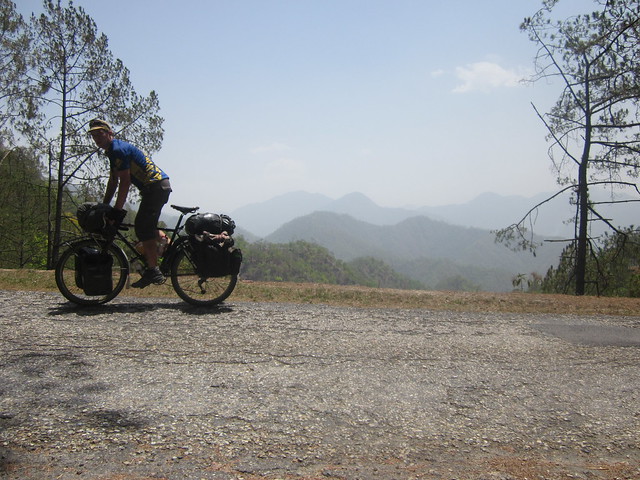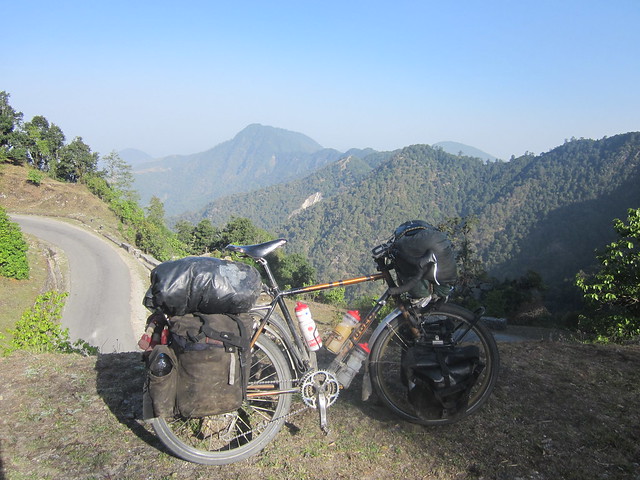Two hundred kilometres. That's two days, right? Unless it's extremely hilly, of course. I met a couple of Nepali cyclists while finding my way out of Kathmandu, and they assured me that it was flat, apart from a couple of big hills.
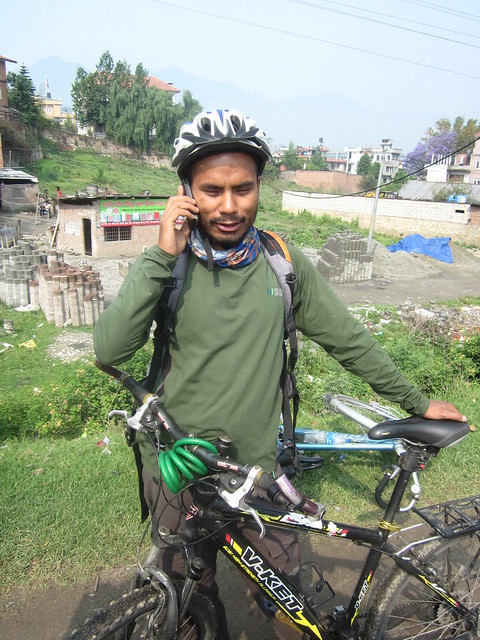
Good job I didn't believe them. I doubt there's enough flat in the whole route to make a passable cricket square. It probably is flat for Nepal.
I would have cleared it in two days, but I was still recovering from the chesty cold which plagued my time in Kathmandu. I felt increasingly spaced out as the days wound on and I found myself unable and unwilling to ride any further.
Maybe I should have had an extra day in Kathmandu, but there was a strike on, which was fabulous. The road was almost deserted, and I took advantage of that. I still saw half a dozen wagons and buses which had tipped over or come off the road. It's a notoriously dangerous run - I was pleased that I hit it when it was so quiet. The strikes are incredibly disruptive to travel as the roads are blocked and most bus services are cancelled. I'm lucky to have a bike, on which I can skirt around the roadblocks, smiling and waving at the protestors, who smile and wave back.
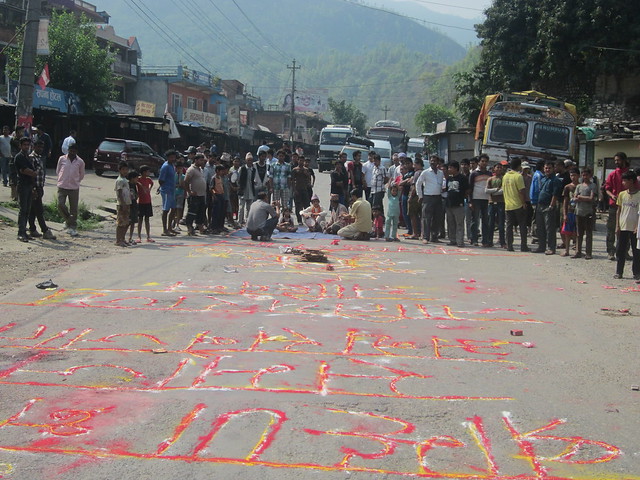
Not that I really appreciated it, but it was a beautiful route. After the climb over the lip of the bowl of the Kathmandu Valley, it followed the widening river, tending down through a valley surrounded by green hills and impromptu waterfalls flowing down the hillsides, fed by the overnight rains. The monsoons seem to be developing a little earlier this year - a day's weather follows a similar pattern, clear in the morning, clouds developing on the peaks through the day and heavy, thundery showers descending by four o'clock.

I didn't fancy riding on slick roads in those conditions so I only rode forty miles on the first day and stopped when I heard the rumbles of thunder. It was a convenient excuse to stop, which I'd wanted to anyway.
I cooked some noodles in my cheap guest house, just as the rain and thunder were at their fiercest. I heard a huge crash outside, and realised that it wasn't another thunderclap. I looked outside to the highway, and there was a wagon on its side, and people were rushing out to help. I've no idea how the driver managed that, on a straight road, but it confirmed my decision to get off the road in the wet, and a few minutes later the driver was lifted out of his cab, looking shaken but unhurt. It was still there when I left in the morning.
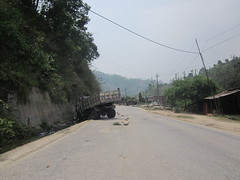


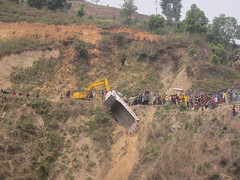
The road continued to follow the river valley down to Mugling, sweeping up the hillsides often enough to make me remember the "flat" description with a wry smile. The sun beat down. It was hot. I was quite bad tempered, especially after the second night where I stayed at the fourth guest house I checked, having rejected the others for reasons varying from horribly overpriced to death trap stairs. Shame I didn't realise the place where I did stay was mosquito hell. I hardly slept for scratching at the lumps which developed on my arms until they relented at dawn.
I didn't notice the second big hill, or it blended too much into the up-down pattern to register as a hill. There was a five-mile climb out of Dumre followed by a delicious descent. Maybe that's the one they meant.
I went on a quest for second breakfast, having started the day with coffee and porridge. I was unsuccessful. The first place I stopped, I waited twenty minutes before they had the courtesy to tell me they couldn't make two-thirds of my order, and at the second place it was thirty minutes before they brought out my alleged meal. I'd ordered a cheese and ham toastie. What they gave me was a paneer burger, which I refused to pay for. Hungry and frustrated, I left, and bought some cheese puffs and muesli bars at the next town. It was only twenty miles to Pokhara so I was happy enough to escape from the midday sun for a couple of hours and chat with a couple of Austrian cyclists heading the other way.
The clouds started to form again, and serious rain to fall. This took the edge off the heat, and I thought I may as well carry on. "Soft as shite, soft as shite, soft as shite", I sang at the motorbikers who were ducking into the bus shelters. Riding through heavy rain is a great experience. I was quickly soaked to the skin and wonderfully cool, my shorts and jersey were clinging to me and still the rain fell.
I found an optician's in Pokhara and bought some lens solution, my bottle having spilled in my bag the previous day. This coincided with me leaving my glasses in a guest house, and followed on from losing my wallet. There was a huge tear in the rear pocket on my shorts, and I was so out of it that I simply forgot, and my wallet probably ended up down the highway somewhere. It only had about a tenner and my Stockton Borough Council library card in it, but I was still annoyed at myself.
I found a guest house near the Lakeside in Pokhara, which was even more of a mozzie-infested fleapit than the previous night's place. But by the time I'd got in and checked the room, I was too cold and shivery and tired to go anywhere else. The shower was wonderfully warm.
Of course, the next morning I realised I was only a mile from the heart of the tourist district at Lakeside. I had a very welcome not-entirely-unlike-a-full-English-breakfast and found a much nicer guest house, where I slept the day away. There are times to be moving, and times to do nothing. These days in Pokhara, I've really enjoyed doing nothing.

Good job I didn't believe them. I doubt there's enough flat in the whole route to make a passable cricket square. It probably is flat for Nepal.
I would have cleared it in two days, but I was still recovering from the chesty cold which plagued my time in Kathmandu. I felt increasingly spaced out as the days wound on and I found myself unable and unwilling to ride any further.
Maybe I should have had an extra day in Kathmandu, but there was a strike on, which was fabulous. The road was almost deserted, and I took advantage of that. I still saw half a dozen wagons and buses which had tipped over or come off the road. It's a notoriously dangerous run - I was pleased that I hit it when it was so quiet. The strikes are incredibly disruptive to travel as the roads are blocked and most bus services are cancelled. I'm lucky to have a bike, on which I can skirt around the roadblocks, smiling and waving at the protestors, who smile and wave back.

Not that I really appreciated it, but it was a beautiful route. After the climb over the lip of the bowl of the Kathmandu Valley, it followed the widening river, tending down through a valley surrounded by green hills and impromptu waterfalls flowing down the hillsides, fed by the overnight rains. The monsoons seem to be developing a little earlier this year - a day's weather follows a similar pattern, clear in the morning, clouds developing on the peaks through the day and heavy, thundery showers descending by four o'clock.

I didn't fancy riding on slick roads in those conditions so I only rode forty miles on the first day and stopped when I heard the rumbles of thunder. It was a convenient excuse to stop, which I'd wanted to anyway.
I cooked some noodles in my cheap guest house, just as the rain and thunder were at their fiercest. I heard a huge crash outside, and realised that it wasn't another thunderclap. I looked outside to the highway, and there was a wagon on its side, and people were rushing out to help. I've no idea how the driver managed that, on a straight road, but it confirmed my decision to get off the road in the wet, and a few minutes later the driver was lifted out of his cab, looking shaken but unhurt. It was still there when I left in the morning.




The road continued to follow the river valley down to Mugling, sweeping up the hillsides often enough to make me remember the "flat" description with a wry smile. The sun beat down. It was hot. I was quite bad tempered, especially after the second night where I stayed at the fourth guest house I checked, having rejected the others for reasons varying from horribly overpriced to death trap stairs. Shame I didn't realise the place where I did stay was mosquito hell. I hardly slept for scratching at the lumps which developed on my arms until they relented at dawn.
I didn't notice the second big hill, or it blended too much into the up-down pattern to register as a hill. There was a five-mile climb out of Dumre followed by a delicious descent. Maybe that's the one they meant.
I went on a quest for second breakfast, having started the day with coffee and porridge. I was unsuccessful. The first place I stopped, I waited twenty minutes before they had the courtesy to tell me they couldn't make two-thirds of my order, and at the second place it was thirty minutes before they brought out my alleged meal. I'd ordered a cheese and ham toastie. What they gave me was a paneer burger, which I refused to pay for. Hungry and frustrated, I left, and bought some cheese puffs and muesli bars at the next town. It was only twenty miles to Pokhara so I was happy enough to escape from the midday sun for a couple of hours and chat with a couple of Austrian cyclists heading the other way.
The clouds started to form again, and serious rain to fall. This took the edge off the heat, and I thought I may as well carry on. "Soft as shite, soft as shite, soft as shite", I sang at the motorbikers who were ducking into the bus shelters. Riding through heavy rain is a great experience. I was quickly soaked to the skin and wonderfully cool, my shorts and jersey were clinging to me and still the rain fell.
I found an optician's in Pokhara and bought some lens solution, my bottle having spilled in my bag the previous day. This coincided with me leaving my glasses in a guest house, and followed on from losing my wallet. There was a huge tear in the rear pocket on my shorts, and I was so out of it that I simply forgot, and my wallet probably ended up down the highway somewhere. It only had about a tenner and my Stockton Borough Council library card in it, but I was still annoyed at myself.
I found a guest house near the Lakeside in Pokhara, which was even more of a mozzie-infested fleapit than the previous night's place. But by the time I'd got in and checked the room, I was too cold and shivery and tired to go anywhere else. The shower was wonderfully warm.
Of course, the next morning I realised I was only a mile from the heart of the tourist district at Lakeside. I had a very welcome not-entirely-unlike-a-full-English-breakfast and found a much nicer guest house, where I slept the day away. There are times to be moving, and times to do nothing. These days in Pokhara, I've really enjoyed doing nothing.




